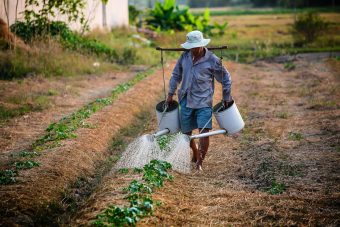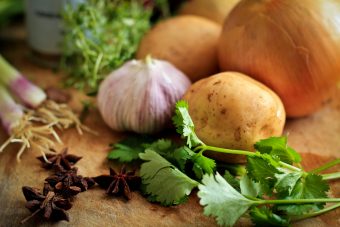
Agriculture is a major user of freshwater withdrawals
Irrigated crops, livestock, fisheries, aquaculture and forestry, account for roughly 70 percent of total freshwater withdrawals globally and for over 90 percent in the majority of Least Developed Countries, of which almost 67 percent is estimated to be used by irrigation. Nevertheless, enhancing irrigation efficiency is not a priority in policy agendas, being overshadowed by the global issue of access to drinking water and sanitation. IFAD is incentivizing practices that enhance irrigation efficiency and increase water productivity, adoption of climate resilient irrigation infrastructure, adopt adequate on farm soil and water management practices, and use high-yielding and drought-tolerant crop varieties.
Most of the population in the world depends primarily on rainfed agriculture for food production
Rainfed agriculture produces more than 60 percent of the food consumed globally. When effective rainfall is lacking, food security is at risk. For some countries, the decline in yield from rain-fed agriculture could be as much as 50 percent. Adoption of resilient water resource management, soil and water conservation, drought-tolerant varieties, and supplemental irrigation would benefit rainfed smallholder farming. IFAD’s investments to enhance the livelihoods of poor rainfed farming communities include rainwater harvesting, soil and water conservation measures, conservation agriculture and agroforestry.
Food production and processing can lead to pollution of water bodies
The food production and processing sectors are both a victim of pollution from industrial waste and municipal sewage discharged into freshwater bodies, and an agent of pollution and a significant amount of wastewater. Agriculture water return flow carries fertilizers and pesticides, oxygen-depleting substances, and pathogens. To address water pollution and protect ecosystems, less polluting practices have to be applied and enhanced technologies and efficiency of wastewater treatment, management and reuse, have to be promoted. IFAD promotes the safe reuse of non-conventional water including wastewater as a reliable source of water that can be safely reused to offset growing water scarcity. It can also be used as a cost-effective and sustainable source of energy, (e.g. through biogas), and nutrients (e.g. through compost).
More:
About 30 percent of the food produced worldwide is lost or wasted every year
In developing countries food waste and losses occur mainly at early stages of the food value chain, and can be traced back to financial, managerial and technical constraints in harvesting techniques, and storage and cooling facilities, and the lack of processing facilities for perishable products. Food loss and waste also amount to a major squandering of resources, including water, land, energy, labour and capital and needlessly produced greenhouse gas emissions. To increase efficiency in agricultural areas, IFAD invests in logistics and infrastructure, such as roads, cold chains, storage, processing and market facilities, as well as in more sustainable farming systems.
Dietary choices affect water resources management

As the buying power of the population in the emerging economy countries improve, they are demanding more nutritious, high-quality and meat-based diets. On a unit weight basis, production of meat-based food ingredients requires more input resources, including water and energy as compared to production of plant-based food products. This dietary change enhances the pressure on water resource constraints.
Without planetary stewardship for water resilience we will not eradicate poverty and hunger
Food and water are the most basic needs essential for human life. Water plays a cardinal role in all aspects of food systems, from production, processing, preparation, consumption, and in part, distribution. Access to essential volumes of water of appropriate quality is fundamental to the existence of secure food systems and a stable society.
Mismanagement of water across sectors has intensified water scarcity, endangering water security
Current policies in water use systems across the food system are economically and environmentally unsustainable. Many of the policies and investments that would improve access to safe water and sanitation as well as sustainable management of freshwater ecosystems, would also support broader food-sustainability targets. Yet, public policies, such as subsidies that support industrialised monocultures, or subsidies to water and energy, as was the case in India, can distort the relative prices of food markets and affect the health of natural ecosystems.
Over 2 billion people currently live in countries experiencing high water stress
All of the Middle East and South Asia, and significant parts of China and North Africa are particularly affected by water stress. About one out of six people on the planet face severe water shortages or scarcity in agriculture. Over three billion people live in agricultural areas with high to very high levels of water shortages (affecting rainfed agriculture) or scarcity (affecting irrigated agriculture), of whom 1.2 billion people live in severely water-constrained areas.
With clean water supplies and sanitation remaining a major problem in many parts of the world, IFAD invests in multiple water use strategies in rural areas, in addition to productive uses, such as livestock watering facilities or reservoirs, and canals for irrigation. We recognize the importance of ecosystem services with respect to the natural water cycle and invest in watershed conservation and rehabilitation to enhance the sustainability of food production.
Source: IFAD
